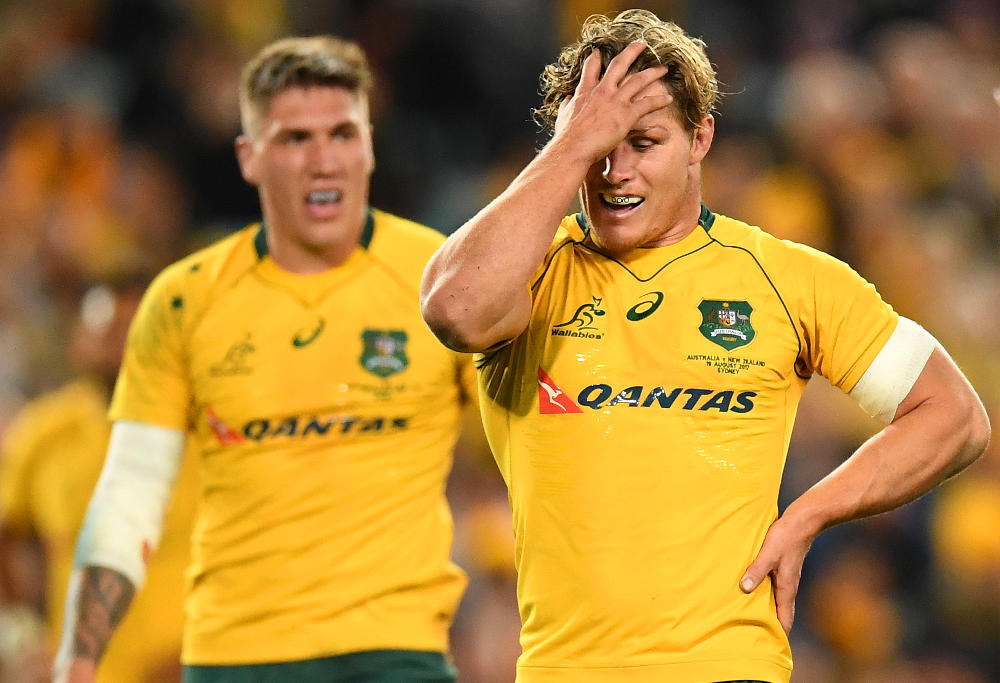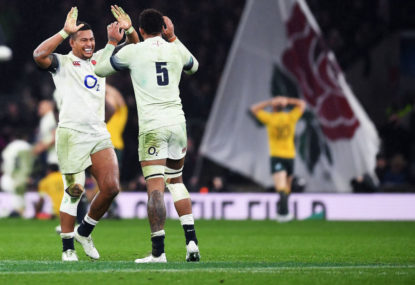Since the Wallabies were beaten at Twickenham by the old enemy, much has been written about the impact that the referee and TMOs had on the result. But I’m not interested in arguing whether the officials got the calls right.
So what should the Wallabies really be spending their time focused on?
Michael Hooper’s disallowed try
Ignoring the referee’s decision, there are two key aspects to this situation that the Aussie captain and side in general need to learn from.
Firstly, Michael Hooper needs to smarten up. Many have said that it’s impossible to expect a player running at full tilt to stop on a cent when he’s in front of a kicker and allow an onside player to rush past him, but Hooper needs to be seen to be making more of an effort to get on side.
Against England, he slowed from a sprint to a run and brought his hands up in some sort of power rendition of the ‘Macarena’. That’s not going to convince anybody, least of all a ref and TMO who have 70,000 Pommies in the crowd screaming for an offside call.
Hooper likes to play at the edge, which is understandable and arguably much needed, but he’s got to get better at it.
Secondly, what on Earth was Marika Koroibete doing?
He is about five metres from the English line with the nearest defender a metre behind him. All he needs to do is dive on that ball and let the wet ground and his momentum see him slide in for his team’s first try.
Instead, he tries to show off his soccer skills and we all know how it ended.

Michael Hooper of Australia. (AAP Image/Dean Lewins)
Hooper’s yellow card
The captain might have looked confused and disgusted as he was shown his eighth yellow card at international level, but when he watches the replay he really should be kicking himself.
Within one passage, the Wallabies committed four penalty offences, all within about ten metres of their own line, Hooper being guilty of two of them. A successful international skipper doesn’t put himself in the sights of the referee.
The team did well to concede just the one penalty goal while he was off the field but, again, errors in judgement like this need to be removed if Hooper wants to become one of the great leaders.
He now stands alone on top of the most yellow cards in international rugby, which is pretty impressive after just 78 matches – that’s averaging a yellow every nine games.
If one of these is in the World Cup, it could be critical.
Kurtley Beale’s yellow card
Kurtley Beale’s attempted interception was a real instinctive move and it’s hard to stop those. You see the ball, for a split second you think you might have a chance of getting to it, but as you reach out you already know this is going to end badly.
But it’s the context of the situation that Beale needs to work on.
His skipper had been sent off just a few minutes ago and the opposition were ahead on the scoreboard. Was it really the time to try and intercept the ball and risk the fallout?
Beale should not be giving the ref a chance to even think about whether he needs to award a yellow card in that situation.
[latest_videos_strip category=”rugby” name=”Rugby”]
Koroibete’s disallowed try
What was Stephen Moore doing in that position? He was in the way and either should have just stayed clear altogether or been up Koroibete’s backside, helping to drive him over the line.
In the chaotic, frenzied nature of international rugby, it’s hardly surprising a player finds themselves out of position from time to time. But again, at this level, in those situations, these mistakes must drive Michael Cheika up the wall. You just can’t squander these opportunities, especially in tight games in wet conditions.
Elliot Daly’s try
There seemed to be literally a blade of grass in this one and while modern technology is good, it’s not at a standard where TMOs can zoom into the blade level.
However, this wouldn’t be an issue if Beale had worked harder and been in position to either kick the ball out himself, pick up the ball or tackle Elliot Daly.
Of course the ball looked like it was going into touch and many players would have assumed that there was no imminent danger, but successful coaches the world over preach the value of taking assumptions out of their team’s approach and doing everything possible to minimise the role that luck plays in results.
Three tries in ten minutes highlights bench issues
At 69 minutes the score was 13-6 to England. Australia had just had Koroibete’s try ripped away from them, but they were still in the game, and had ten minutes to score at least seven points.
Instead, those ten minutes saw England run in three tries and wrap up a fifth consecutive victory over the Wallabies.
Each try was nicely finished, using their boots well in this final period to get in behind the Aussie defence. But during this period we saw how different the two benches were – England’s ‘finishers’ came on and had a huge impact. Australia’s bench meanwhile really added little in either attack or defence.
Tevita Kuridrani’s missed try
53 minutes gone and Tevita Kuridrani’s got a golden opportunity to score under the posts and give Australia the lead.
Hooper and Beale had just returned to the pitch, the Aussies had weathered the storm brilliantly, and now they were going to break English hearts by taking the lead.
Instead, he knocks on a relatively straightforward catch, England kick ahead and 30 seconds later Daly has scored.
Kuridrani is not ready for international rugby. He’s been found wanting a few too many times in defence and his attack skills just aren’t quite there.
Of course, catching a wet ball in the heat of battle is easy to do from here, and a lot harder on the pitch – but on the pitch is where it matters and it’s where the Wallabies let themselves down too many times in this match.
Catch the ball and there’s no debate over whether the ball was out or not from the kick or whether Beale should have done better. Catch the ball and potentially the Aussies take the lead and a big step towards breaking the English.
Each of these situations is marginal. Each has extenuating factors. But in each one, a Wallaby could have, perhaps should have, done better. Seven situations in one match – get half of them right and that’s the win.
The Wallabies are getting better for sure, especially when compared to 2016, and if they go well in 2019 then no one will give a damn about this past weekend’s result.
But if they don’t start to reduce the number of these big mistakes, then they are not going to threaten the best sides in Japan and will instead be left arguing that the ref made too many bad calls.






























































































